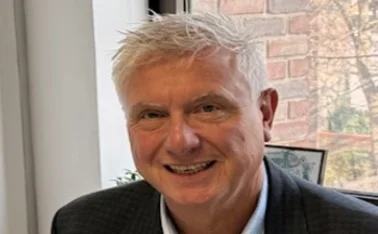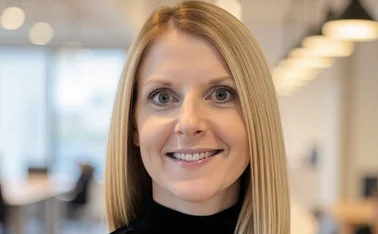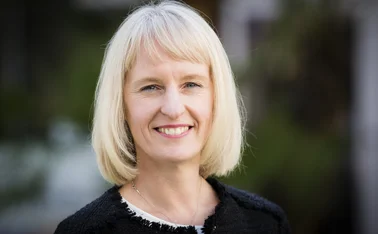
Broking success: Straight down the middle
Jelf group chief executive Alex Alway and chief executive (insurance) Phil Barton explain why, despite ambitions for growth, they are keen to keep the broker close to its clients. Andrew Pearce reports
▶ What is Jelf’s ethos?
Alex: We don’t want to be the biggest broker, we have no desire to compete with some of the bigger beasts. The one thing we look for when we acquire or grow is that ethos of focusing on the client – that’s central to it all.
Phil: To be the trusted adviser. We don’t want to be a transactional broker. We want to act as a non-executive director for our owner-managed clients on a day-to-day basis, advising them on a broad range of issues. It’s a much more consultative approach to solving clients’ problems. We can preserve firms from going out of business and pick them up when disaster strikes. Our challenge has been to bring client relationship management up to the same level as technical competence.
▶ What would you attribute Jelf’s 2013 financial performance to?
Alex: Figures are one way of assessing success but we wouldn’t be anywhere if we didn’t get the loyalty of our clients. We invested very heavily in the people, infrastructure and business and we’re now starting to see the benefits. We were able to do that because we weren’t financially constrained.
Phil: We’ve invested in a major new regional centre in the Midlands, as well as new offices in Redditch, Stratford, Manchester, Worthing and Swansea. We’ve created a great environment for people to work in and they have responded.
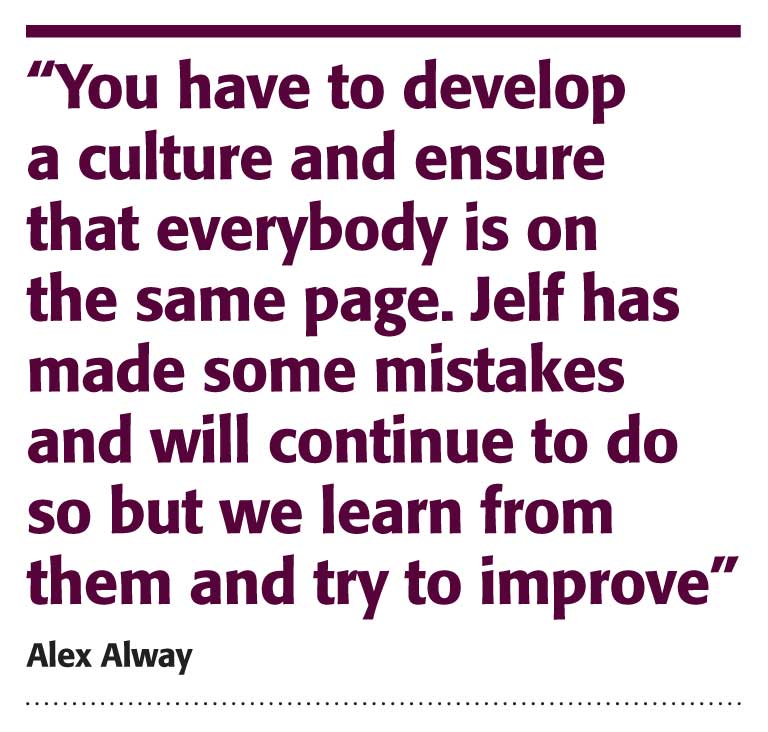 ▶ Is Jelf on the pathway to sustained profitability?
▶ Is Jelf on the pathway to sustained profitability?
Alex: We’re not as financially indebted as some but we do have the same challenges.
Phil: We’ve travelled further than most consolidators in terms of integrating the business. We act as a single broking business across the UK rather than a conglomerate of smaller businesses that have been brought together through acquisition.
▶ How difficult is the integration process?
Alex: It’s extremely difficult and requires the highest level of management skill – it’s multi-layered. People initially think about the infrastructure or the branding but, as we’ve experienced, there is a whole set of projects and initiatives that need to be done. You have to develop a culture and ensure that everybody is on the same page. Jelf has made some mistakes and will continue to do so but we learn from them and try to improve.
▶ How pleasing has it been to reduce Jelf’s debt?
Alex: Before we acquired The Insurance Partnership (TIP) we were in credit for the first time in a long while, but it will always fluctuate depending on whether we have an acquisition. It’s very rewarding for all of the hard work everyone has undertaken. Having less financial constraint helps us enormously. We never stand still so I can’t say we won’t borrow a bit more to acquire another fabulous business like TIP.
Phil: It’s been an advantage to have been listed. It has enabled us to access equity capital as well as debt capital. Ours is a blended access to capital model. Those private companies that have sought to grow simply through debt have ended up with a significant mountain of it.
▶ Is it sometimes frustrating being listed?
Alex: We like the fact that there is a high level of governance in this business – we have a structure in place that supports everything we do. I can’t say there isn’t a time in a broker’s development when you’d rather be off-market as opposed to on. But after 10 years, we are where we are and we don’t give it much thought really.
Phil: It helps you remain disciplined. That has enabled us to address potential issues and challenges earlier than others who didn’t have that discipline and governance requirement. While it’s uncomfortable at times, over the period it has served us well.
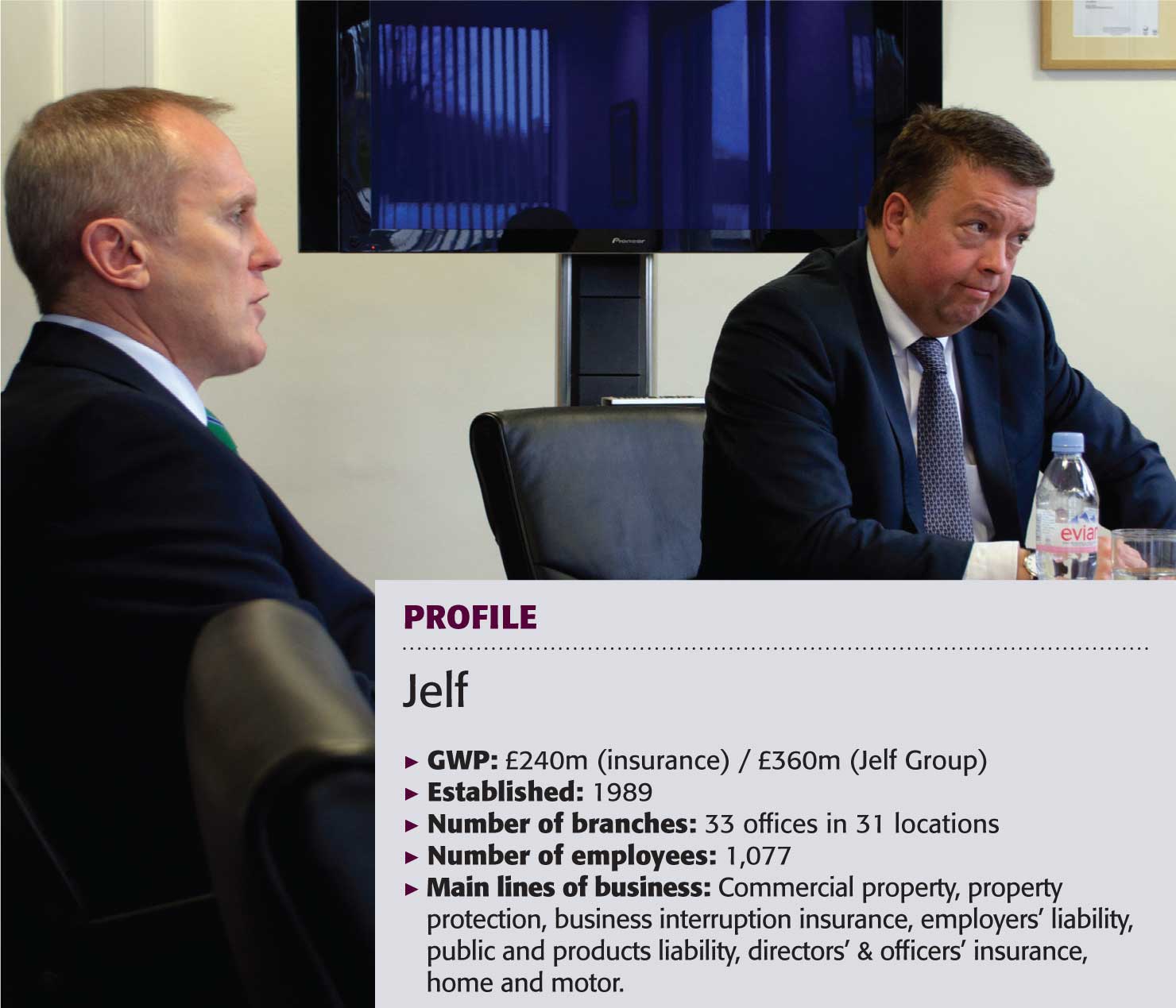
▶ Are you envious of others who can keep financial matters under their hat?
Alex: My FD constantly complains about the accounting treatment of others but no is the answer.
▶ How has TIP bedded in?
Phil: We’ve made great strides over the first six months. You put Jelf and TIP together and you get a very significant player in the schemes and affinity market. If this had been a business school case study it would almost have been the perfect acquisition. TIP brought its schemes and affinities business and corporate proposition and we brought our capability around systems, Acturis, personal lines and SME business. Geographically the two businesses dove-tailed beautifully.
Alex: We’re hoping to open new offices in Leeds and I know we’re looking at premises in Wolverhampton as well [for what was TIP].
▶ Alex, you’ve previously said Jelf should be a fast-follower as opposed to a first-mover in terms of e-trading? Is this still the case?
Alex: Affinities and the development of the capabilities around them is a good example of where we’ve thought we won’t go head-to-head with the market. But if we can pick strategically where we can make a difference then why wouldn’t we? The investment that we’ve undertaken last year is proof of that
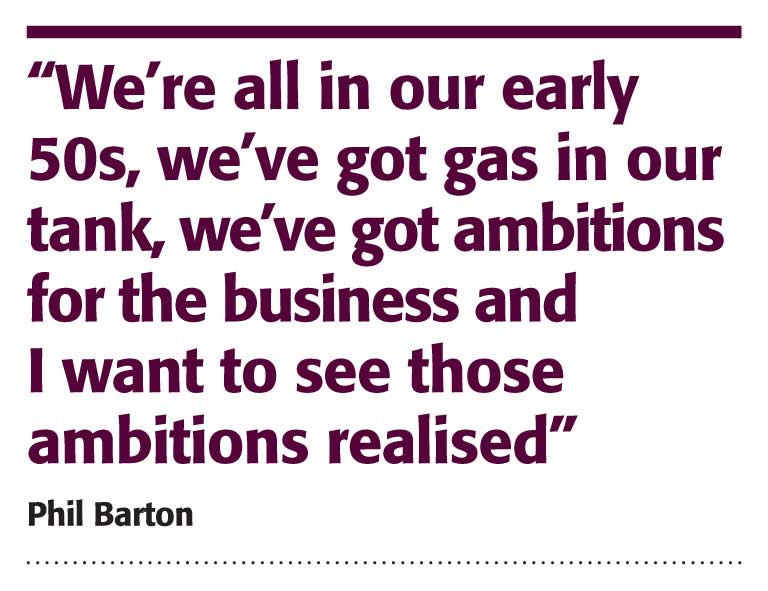 ▶ Are there any further acquisitions in the pipeline?
▶ Are there any further acquisitions in the pipeline?
Alex: I am bound by stock market rules so I’ve got to be careful about what I say – we’re actively looking. Generally some of the mega deals, such as Gallaghers buying Giles, have stimulated a lot of activity. This year will see the completion of some significant deals but we will certainly not be a player in the restructuring of the mid-market. We will be an active player in the M&A market but we’ve got to find the businesses which are right for us.
▶ Why is Jelf avoiding the big deals?
Alex: We’re doing very well as we are. We don’t want to be the biggest. We want to be a company you respect if you come into competition with us, and say ‘that’s a good brokerage’.
▶ Is there a danger of being lost in the middle-ground?
Alex: I would turn it into a virtue. It’s having the strength of a national footprint but the ability to still feel like an owner-managed business.
Phil: We are big enough to have an impact in the marketplace. The challenge in getting big is not to lose connectivity with your client base. We work very hard at delivering a very personal service to our clients. I don’t want Jelf to feel like a large corporate for our people or clients
▶ How has Jelf’s network the Purple Partnership performed over the past 12 months?
Alex: It’s been an exceptionally good year. We’ve doubled staff numbers and given [managing director] Les Brewin an opportunity to grow the business. We see some very positive opportunities. We’re getting enquiries all the time from members of existing networks and people that are looking at whether they should be part of a network.
▶ Would Jelf ever be acquired?
Alex: I can’t foresee a situation where anybody would approach us without it being public knowledge. We’ve never had an approach in 10 years. You would have read about it because it would have had to be in the listed environment.
Phil: The management team has been together for in excess of 10 years. We’re all in our early 50s, we’ve got gas in our tank, we’ve got ambitions for the business and I want to see those ambitions realised.
▶ What are the main challenges for brokers?
Alex: We feel passionately about the development of the profession. We still need to do an awful lot more work with a unified voice in that area. The industry needs to pull together. We’re a bit jaundiced – I’m fed up with talking shops. We’ve seen various initiatives and I would like them to be more focused and effective. That might offend a few people. A code of ethics is a good start and we should have that enshrined. If we spent a bit more effort focusing on that rather than grandstanding on various other things we’d have a lot more progress.
Phil: In fairness the Chartered Insurance Institute performs an excellent role developing the industry’s technical capabilities and the British Insurance Brokers’ Association also represents the broking fraternity very well. Its recent restructure will enable that still further.
Only users who have a paid subscription or are part of a corporate subscription are able to print or copy content.
To access these options, along with all other subscription benefits, please contact info@insuranceage.co.uk or view our subscription options here: https://subscriptions.insuranceage.co.uk/subscribe
You are currently unable to print this content. Please contact info@insuranceage.co.uk to find out more.
You are currently unable to copy this content. Please contact info@insuranceage.co.uk to find out more.
Copyright Infopro Digital Limited. All rights reserved.
As outlined in our terms and conditions, https://www.infopro-digital.com/terms-and-conditions/subscriptions/ (point 2.4), printing is limited to a single copy.
If you would like to purchase additional rights please email info@insuranceage.co.uk
Copyright Infopro Digital Limited. All rights reserved.
You may share this content using our article tools. As outlined in our terms and conditions, https://www.infopro-digital.com/terms-and-conditions/subscriptions/ (clause 2.4), an Authorised User may only make one copy of the materials for their own personal use. You must also comply with the restrictions in clause 2.5.
If you would like to purchase additional rights please email info@insuranceage.co.uk



